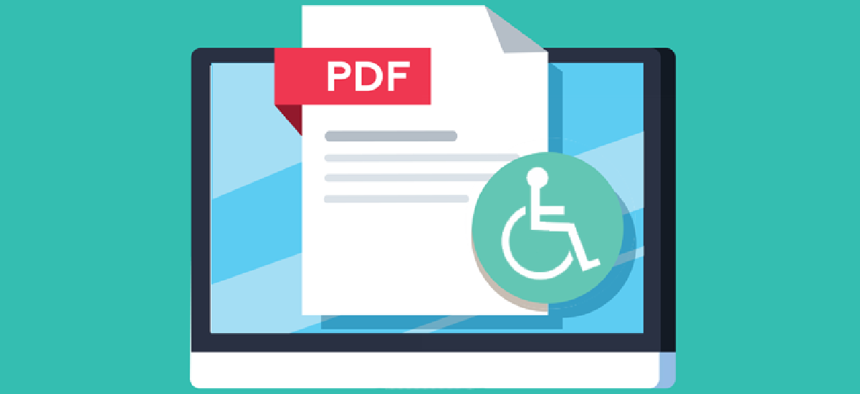Meeting the accessibility challenge for static documents

Document accessibility software can automate the remediation of thousands of web-hosted PDF documents, saving agencies time and money.
Part 2 of a two-part series on document accessibility software.
Although roughly 54% of adults living with a disability conduct business online, the accessibility of web content has lagged behind demand. According to one study, 70% of websites -- including many of those offering government services -- contain accessibility blocks that make them unreadable for those who are blind or partially sighted, even with assistive technology. For Americans living with visual impairments, the inability to access tax and building codes, rate sheets, forms and other static documents can be a critical barrier to obtaining much-needed services. For government entities, failing to provide accessible documents can lead to expensive lawsuits and prosecution by the Department of Justice. In fact, the number of lawsuits around digital accessibility jumped from 57 in 2015 to more than 3,000 just three years later.
In the first article of this two-part series, we looked at how document accessibility software can automate conversion and remediation of personalized, transactional documents, such as tax bills and account notices. In this article, we’ll explore how automated solutions can overcome some of the challenges associated with remediating static documents -- i.e. those items, like tax and building codes that are often housed on a website. We’ll also discuss how to overcome some of the biggest barriers to adopting document accessibility software and where this technology is headed in the future.
When it comes to making static documents accessible, government entities face two key challenges. The first is converting website documents into an accessible format; the second is implementing processes to ensure that new and updated documents all remain compliant. Because Section 508 of the Rehabilitation Act requires government entities to make web content accessible to constituents in a form they can consume, most organizations remediate HTML components as part of their overall process for making sure their websites are compliant with Web Content Accessibility Guidelines (WCAG). However, government agencies still need a way to remediate the thousands of PDF documents hosted on their websites, and this is where document accessibility software can save a significant amount of time, effort and money.
The first step to making PDF documents accessible is to identify how many PDF files are out of compliance and how many pages are in each document. After gathering that information, agencies need to convert their documents into WCAG-compliant, accessible PDFs. This process is so labor-intensive and time-consuming that many organizations outsource the task to a third party or use accessibility software to automate as much of the process as possible.
But remediating existing documents is only half the battle. Agencies must also confirm that documents remain accessible when they are updated and every time new documents are introduced. Many organizations run website scans periodically to facilitate this process. Commonly used composition software like Microsoft Word can create accessible PDFs. However, users must be trained on accessibility features, and employees must be monitored to verify that they are using these capabilities correctly. Taking advantage of add-ons in Microsoft Word can reduce training time and encourage adoption among agency staff.
Document accessibility software is another tool that can cut down on the amount of time and effort involved in converting and remediating static document by interpreting and creating an accessible version of the deficient document. This includes tagging elements so they can be identified by assistive technology; properly defining elements such as headings, list elements, tables and URL links; setting the reading order so the document will make sense to the consumer; adding alternate text to all graphics so they can be easily understood; and marking any unnecessary elements as artifacts so they will be ignored by assistive technology. By automating tagging and many of these other tasks, agencies can significantly reduce the amount of time it takes to make these documents accessible.
Considering the number of PDF documents -- some of them running to 100 pages or more -- that government agencies host online, this software is clearly a powerful time-saving tool for complying with accessibility requirements. Still, not every task can be automated. Setting the reading order for non-sequential documents, adding alternate text and identifying artifacts require some user effort.
Given all these benefits, it’s unclear why more government agencies haven’t embraced document accessibility software. One of the biggest barriers to adoption appears to be overcoming the momentum of existing processes. Conversion is difficult to do without qualified accessibility specialists, who can be challenging to find. It also takes commitment and resources to train large numbers of employees to navigate the subtleties of accessibility and make it part of their daily routine. Additionally, it is essential to designate experts in the subject matter who can then lead accessibility initiatives. Setting up and funding centers of excellence is probably the No. 1 step agencies can take to overcome these challenges.
As we enter a new decade, developers remain focused on reducing the manual effort it takes to convert and remediate complex documents by improving automatic tagging and other features. Automating quality assurance is also a top priority. The goal is to test files once when they are converted and then log any errors for follow up and correction.
Agencies wondering whether document accessibility software is worth the money should consider the costs of outsourcing this process to a service bureau, as well as the immense effort it takes to tag and remediate documents using a general purpose PDF processing program, like Adobe Acrobat Pro. Consider, too, the cost of non-compliance: legal fees, fines or even loss of funding. Given the cost savings and increased productivity that document accessibility software provides, this is technology that delivers a great return on investment.





